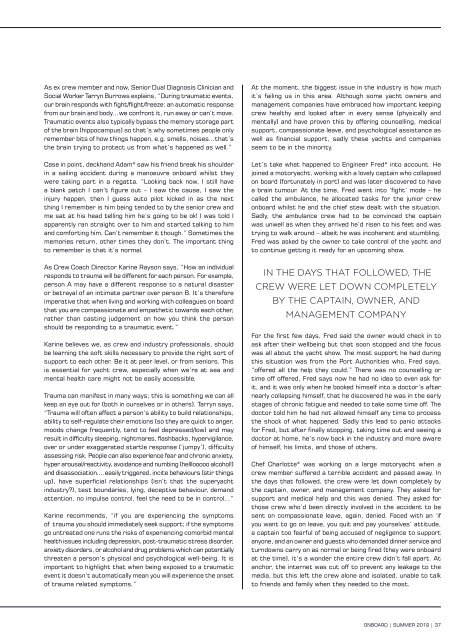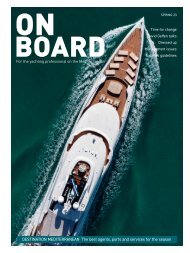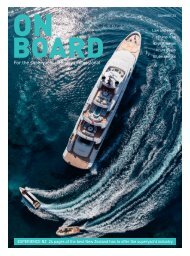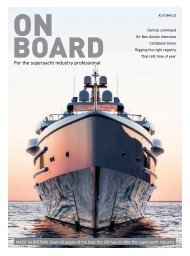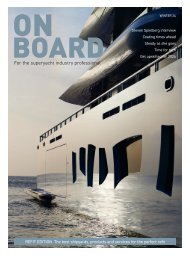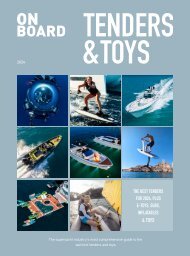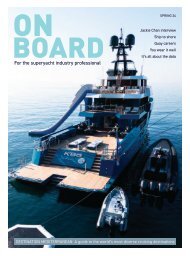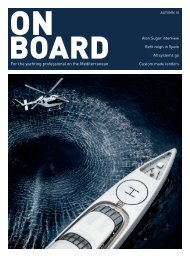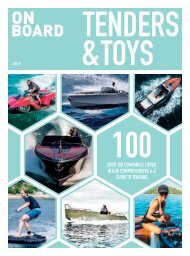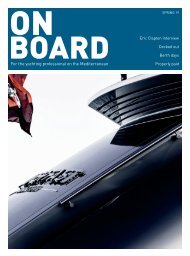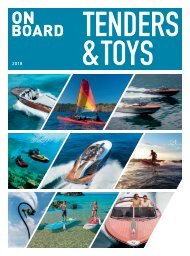ONBOARD Magazine summer 2019
Each issue of ONBOARD Magazine is packed with entertaining and informative features – from technical and educational to lighthearted and lifestyle. All specifically aimed at the yachting professionals with buying power. Our renowned team of journalists and in-house editors deliver regular news items, interviews, reviews and features on essential products and services for every superyacht professional, whether at work or when having fun. The summer 2019 edition is out now and includes features on Electric Tenders, VSAT, Registration, Marinas in the eastern Mediterranean, Interior linens and fabrics, RIBs and what to do when you have expensive artwork on board. Plus, don’t forget to review our 2019 Tenders & Toys supplement. This annual publications includes all you need to know about the latest and great toys, ATVs, Jet Boards, a look at support vessels, gyms and exercise areas on board yachts and our industry leading A-Z tender listing with over 130 vessels.
Each issue of ONBOARD Magazine is packed with entertaining and informative features – from technical and educational to lighthearted and lifestyle. All specifically aimed at the yachting professionals with buying power. Our renowned team of journalists and in-house editors deliver regular news items, interviews, reviews and features on essential products and services for every superyacht professional, whether at work or when having fun. The summer 2019 edition is out now and includes features on Electric Tenders, VSAT, Registration, Marinas in the eastern Mediterranean, Interior linens and fabrics, RIBs and what to do when you have expensive artwork on board. Plus, don’t forget to review our 2019 Tenders & Toys supplement. This annual publications includes all you need to know about the latest and great toys, ATVs, Jet Boards, a look at support vessels, gyms and exercise areas on board yachts and our industry leading A-Z tender listing with over 130 vessels.
Create successful ePaper yourself
Turn your PDF publications into a flip-book with our unique Google optimized e-Paper software.
As ex crew member and now, Senior Dual Diagnosis Clinician and<br />
Social Worker Tarryn Burrows explains, “During traumatic events,<br />
our brain responds with fight/flight/freeze: an automatic response<br />
from our brain and body…we confront it, run away or can’t move.<br />
Traumatic events also typically bypass the memory storage part<br />
of the brain (hippocampus) so that’s why sometimes people only<br />
remember bits of how things happen, e.g. smells, noises…that’s<br />
the brain trying to protect us from what’s happened as well.”<br />
Case in point, deckhand Adam* saw his friend break his shoulder<br />
in a sailing accident during a manoeuvre onboard whilst they<br />
were taking part in a regatta. “Looking back now, I still have<br />
a blank patch I can’t figure out – I saw the cause, I saw the<br />
injury happen, then I guess auto pilot kicked in as the next<br />
thing I remember is him being tended to by the senior crew and<br />
me sat at his head telling him he’s going to be ok! I was told I<br />
apparently ran straight over to him and started talking to him<br />
and comforting him. Can’t remember it though.” Sometimes the<br />
memories return, other times they don’t. The important thing<br />
to remember is that it’s normal.<br />
As Crew Coach Director Karine Rayson says, “How an individual<br />
responds to trauma will be different for each person. For example,<br />
person A may have a different response to a natural disaster<br />
or betrayal of an intimate partner over person B. It’s therefore<br />
imperative that when living and working with colleagues on board<br />
that you are compassionate and empathetic towards each other,<br />
rather than casting judgement on how you think the person<br />
should be responding to a traumatic event.”<br />
Karine believes we, as crew and industry professionals, should<br />
be learning the soft skills necessary to provide the right sort of<br />
support to each other. Be it at peer level, or from seniors. This<br />
is essential for yacht crew, especially when we’re at sea and<br />
mental health care might not be easily accessible.<br />
Trauma can manifest in many ways; this is something we can all<br />
keep an eye out for (both in ourselves or in others). Tarryn says,<br />
“Trauma will often affect a person’s ability to build relationships,<br />
ability to self-regulate their emotions (so they are quick to anger,<br />
moods change frequently, tend to feel depressed/low) and may<br />
result in difficulty sleeping, nightmares, flashbacks, hypervigilance,<br />
over or under exaggerated startle response (‘jumpy’), difficulty<br />
assessing risk. People can also experience fear and chronic anxiety,<br />
hyper arousal/reactivity, avoidance and numbing (helllooooo alcohol!)<br />
and disassociation….easily triggered, incite behaviours (stir things<br />
up), have superficial relationships (isn’t that the superyacht<br />
industry?), test boundaries, lying, deceptive behaviour, demand<br />
attention, no impulse control, feel the need to be in control…”<br />
Karine recommends, “if you are experiencing the symptoms<br />
of àtrauma you should immediately seek support; if the symptoms<br />
go untreated one runs the risks of experiencing comorbid mental<br />
health issues including depression, post-traumatic stress disorder,<br />
anxiety disorders, or alcohol and drug problems which can potentially<br />
threaten a person’s physical and psychological well-being. It is<br />
important to highlight that when being exposed to a traumatic<br />
event it doesn’t automatically mean you will experience the onset<br />
of trauma related symptoms.”<br />
At the moment, the biggest issue in the industry is how much<br />
it’s failing us in this area. Although some yacht owners and<br />
management companies have embraced how important keeping<br />
crew healthy and looked after in every sense (physically and<br />
mentally) and have proven this by offering counselling, medical<br />
support, compassionate leave, and psychological assistance as<br />
well as financial support, sadly these yachts and companies<br />
seem to be in the minority.<br />
Let’s take what happened to Engineer Fred* into account. He<br />
joined a motoryacht, working with a lovely captain who collapsed<br />
on board (fortunately in port) and was later discovered to have<br />
a brain tumour. At the time, Fred went into ‘fight’ mode – he<br />
called the ambulance, he allocated tasks for the junior crew<br />
onboard whilst he and the chief stew dealt with the situation.<br />
Sadly, the ambulance crew had to be convinced the captain<br />
was unwell as when they arrived he’d risen to his feet and was<br />
trying to walk around – albeit he was incoherent and stumbling.<br />
Fred was asked by the owner to take control of the yacht and<br />
to continue getting it ready for an upcoming show.<br />
IN THE DAYS THAT FOLLOWED, THE<br />
CREW WERE LET DOWN COMPLETELY<br />
BY THE CAPTAIN, OWNER, AND<br />
MANAGEMENT COMPANY<br />
For the first few days, Fred said the owner would check in to<br />
ask after their wellbeing but that soon stopped and the focus<br />
was all about the yacht show. The most support he had during<br />
this situation was from the Port Authorities who, Fred says,<br />
“offered all the help they could.” There was no counselling or<br />
time off offered, Fred says now he had no idea to even ask for<br />
it, and it was only when he booked himself into a doctor’s after<br />
nearly collapsing himself, that he discovered he was in the early<br />
stages of chronic fatigue and needed to take some time off. The<br />
doctor told him he had not allowed himself any time to process<br />
the shock of what happened. Sadly this lead to panic attacks<br />
for Fred, but after finally stopping, taking time out and seeing a<br />
doctor at home, he’s now back in the industry and more aware<br />
of himself, his limits, and those of others.<br />
Chef Charlotte* was working on a large motoryacht when a<br />
crew member suffered a terrible accident and passed away. In<br />
the days that followed, the crew were let down completely by<br />
the captain, owner, and management company. They asked for<br />
support and medical help and this was denied. They asked for<br />
those crew who’d been directly involved in the accident to be<br />
sent on compassionate leave, again, denied. Faced with an ‘if<br />
you want to go on leave, you quit and pay yourselves’ attitude,<br />
a captain too fearful of being accused of negligence to support<br />
anyone, and an owner and guests who demanded dinner service and<br />
turndowns carry on as normal or being fired (they were onboard<br />
at the time), it’s a wonder the entire crew didn’t fall apart. At<br />
anchor, the internet was cut off to prevent any leakage to the<br />
media, but this left the crew alone and isolated, unable to talk<br />
to friends and family when they needed to the most.<br />
<strong>ONBOARD</strong> | SUMMER <strong>2019</strong> | 37


